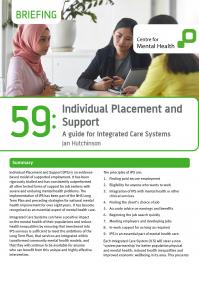A guide for Integrated Care Systems
Jan Hutchinson
Many people with a mental health difficulty want to work, but aren’t offered the right support to be able to do so. Individual Placement and Support (IPS) is an evidence-based model of supported employment which helps people with mental health difficulties into work and provides continued in-work support. It has consistently outperformed all other forms of support for people with severe and enduring mental health problems.
This briefing sets out why and how IPS works, and how new Integrated Care Systems (ICSs) can help more people living with mental health difficulties into employment by investing in IPS.
IPS is based on eight key principles:
- Focus on open paid employment
- Eligibility is a choice and a right
- Integration of IPS with mental health or other clinical and support services
- Finding a preferred role
- Personalised benefits advice
- Rapid job search
- Employer engagement and job development
- Time-unlimited and individualised in-work support
By ensuring the continued and expanding availability of IPS, Integrated Care Systems can tackle a major health inequality and ensure no one is left without the right help to enable them to make a living. The NHS Long Term Plan is already expanding IPS to support 44,000 people across England by the end of this year. But there is a long way to go before it’s available to anyone who might benefit from it.
Tackling health inequalities begins with tackling poverty, and for this reason, IPS works.







